A summary of the Festival, its importance to Macau (according to the author) and some of the opinions of the participants have already been covered in the pages of this magazine.
Putting aside the question of how the Festival was organized we can go on to a brief examination of the reasons behind the Festival and its objectives. I have had to reduce the length of this article due to limitations of space but, despite this, I will try to keep the key ideas intact.
GREAT THINGS ARE TO BE SEEN FROM A DISTANCE
Macau has no agriculture. We import all our food and drinks from China and the rest of the world. We have neither sources of energy nor minerals. Macau is a tiny, overcrowded city with two equally small islands covering an area of 16 km2.Still, we have a relatively good standard of living and our budget is healthy. We are forced to repatriate the hundreds of illegal immigrants who come to Macau, either by swimming or by one of a number of different methods, because otherwise the city would simply sink under the weight.
So where does this prosperity come from when we have so little of our own? It is common knowledge that it comes principally from gambling revenues. Macau is the third largest casino in the world.
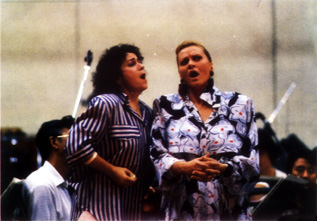
Fortunately,4 however, we profit from other, healthier, activities: the textile industry, toy manufacturers, etc.. Using the skills of an abundant, cheap and hard-working labour force and the capital of broad-minded investors we transform raw materials from abroad into products whose export brings us revenue.
Because we are so closely dependant on foreign markets, currency fluctuation, trade protectionism and so forth, the obvious solution seems to lie in widening our variety of products. An economy which lacks a solid base is liable to sudden instability.
That is why diversification is such an important concept and why it is of the utmost priority to those who administer the Territory.
Tourism is a good example of this policy of diversification. It is an industry which can and should bring a good income. The infrastructure is already quite good, particularly in the hotel sector, but it also depends heavily on gambling for its trade.
We all know that in the Far East Macau is a very important -- I dare say, unique - example of how it is possible for people of different races and cultures to live side by side. For open minded and observant people this blend can be found all over: in the architecture, the patois, the people's features, the cooking and so on. However, the superficial differences are quickly seen. The rest is for people who want to spend time studying it.
Thus, new attractions other than gambling should be offered to visitors who come to Macau to stay for a longer period of time. In short we must develop other inducements.
Although it was not clearly defined by the Government it is obvious that this lay behind the guidelines which were released for the Festival a year ago.
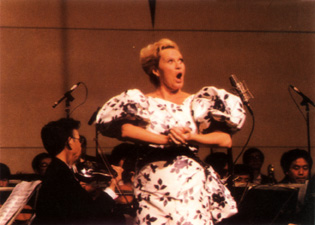
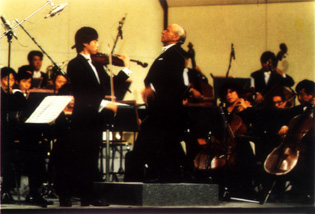
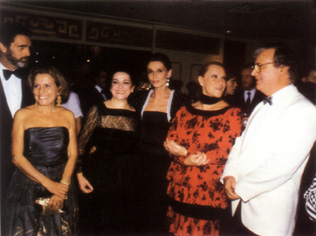
In my opinion what we need is to create a schedule of worthwhile and permanent events through the year attracting various kinds of people who would use the hotels, spend money in the shops, learn about Macau and take away an image to spread abroad. In other words, we need to attract people who would come to Macau regularly and bring more people with them each time.
This is the case with the Macau Grand Prix. Nobody is against it and so far it has been the only event of international repute. Despite the temporary road blocks, noise, pollution, etc., the initial criticisms vanished when people finally realized its importance.
The purpose of the Festival is exactly the same. No one ever thought that we would be bringing the stars of singing and classical music to Macau other than for the enjoyment of just a privileged few (which is an important but not a sufficiently compelling reason). The aim of this project is much wider than that. It is intended to spread the name of Macau worldwide. The audiences became extras on TV and this in turn played a fundamental role in the organization of the Festival.
Other events of the same quality as the Festival should be held with the same objective in mind. A festival of light music could and should be organized with the same scope with an aim to complement the Music Festival rather than provide an alternative.
Film festivals are also planned in addition to other cultural events and technical conferences (computers will be the subject of one of them) taking advantage of our privileged location in the huge Pacific basin on which international interests are increasingly being focussed. The privilege of living between two centuries and, above all, between two different ages, the dying industrial age and the nascent computer age, obliges us to take up this excellent opportunity since the agents of that change are within easy reach and we are one of the gates to China.
It has been necessary to give rather a lengthy explanation of the Festival's objectives in order to understand the reasons behind the Festival. It was not merely an extravaganza nor an intellectual's folly. Although I was responsible for the coordination of the Festival, it was not I who fathered the idea, so I can assure you that this was not the case.
WHY AND HOW
After a quick look at why the Festival was held, I shall now proceed with an examination of its contents and how it went. High artistic quality, a true relationship between western and Chinese music and immediate benefits to those countries at which it was aimed, were absolutely necessary if the desired international standard was to be achieved and guaranteed.
The programme, chosen mainly by Adriano Jordão and the Cultural institute of Macau, and the guest performers provided a high artistic standard. Organizers of the major Portuguese music festivals were invited as was Dra. Maria de Jesus Barroso, the President of the respective association, in order to receive the experts' comments as well as to win support in gaining a top place in the almost closed world of music festivals. This proved to be the right procedure as we were promised enthusiastic support.
At the Festival's opening ceremony, over a hundred talented musicians from the Radio Orchestra of China, led by the remarkable conductor Yun Fang, played a beautiful piece of Chinese music. For the record I would like to suggest that in the future we should widen, and extend the Chinese participation to other areas such as ballet, opera and chorus along with Western performers (as, for example, a choir from Great Britain which has offered to perform, the Gulbenkian Ballet Group, etc.).
As a sign of goodwill towards the international community, the proceedings of the Gala Night were donated to UNICEF in aid of the children protected by that organization.
As a candidate to the world of the great music festivals, high quality, East-West blend and philanthropic objectives must be maintained to guarantee a unique identity for Macaus Music Festival.
It is hardly necessary to give a detailed description of that memorable week from the 24th to the 31st of October. Others have already done so with a greater guarantee of impartiality than I could have offered. The November issue of the excellent magazine "Macau, published by the Government Press Office, included an explanatory article by Fernando Pires (Chief Editor of the Lisbon newspaper "Diário de Notícias").
On those historic nights artistic activity was to be found in the concert halls of the Macau Forum, the Government Palace, the Auditorium of the University of East Asia and in the Church of São Lourenço.
The trilingual Festival brochure which was edited by me and published by the Cultural Institute of Macau with the objective of spreading news of the Festival abroad, gave descriptions of the venues, biographies of the performers and a summary of the programme.
To inform and attract the local audience, five-minute television spots were broadcast just before the news bulletins for two weeks.
All but two concerts were recorded by TDM. In the first quarter of the coming year they will be sold to the major international television networks. In addition to the wholesale or retail sale of recordings, a fifty-minute video tape featuring a summary of the Festival, shots of each concert, images of Macau and the lead singers' excursions in the Territory will be released. The famous actress, Audrey Hepburn, whose gay smile as the young girl in "My Fair Lady" never seems to fade, will also be featured. She will be talking to Mr. Carlos Pinto Coelho, Programme Director for Portuguese Television, about UNICEF and its humanitarian work and requirements.
The final concert, broadcast live to eleven countries including Japan, Korea, Hong Kong, France, Switzerland, Hungary and Norway, was a remarkable achievement. In addition to about sixty million spectators who watched live the memorable "Stabat Mater" in aid of UNICEF, an estimated eleven million watched the inaugural concert which has been called "The Sino-Portuguese Friendship Concert", the proceeds of which were donated to the handicapped children of Macau. In other words, this was the biggest international event ever held in the four hundred years of Macau's history.
... BECAUSE OF THE FLOWER
There is a Greek aphorism which says that the vase gets watered because of the flower. This folk wisdom is particularly relevant to all those who prepare and organize and then remain behind the scenes. If things go wrong the organizing committees are always the scapegoats and criticism is showered upon them.
But if things go well then those who gave their all in order to make a success of it feel, just like the vase, the freshness of the water which gives life to the flower. Tears come to their eyes as they embrace each other and say how it was all worth it. It is true that gratitude comes last of all and when the beauty of a flower is being appreciated the roots are most often forgotten. On this occasion, however, both the performers and the organizers of other festivals were unanimous in their appreciation and Mr. Pires concluded the article to which I referred with the following positive remark: "... a word of praise is more than deserved! Building up a music festival is a very hard task. To build it into the artistic success such as the one held in Macau is indeed an honourable and dignified achievement".
BUT LIFE WAS NOT ALL ROSES
Naturally there were mistakes which must be corrected in the future. It would have taken a miracle to avoid them but it would be unforgivable to ignore them.
Negative factors were the short preparation period (these events need to be prepared at least a year in advance, not just a few months beforehand), the chosen organizational structure (a permanent committee composed of the Cultural Institute of Macau, the Department of Tourism and Macau Television) with a tripartite budget and a predominantly part-time staff. In addition to this, a good piano prepared for the tropical climate and a quality auditorium were sorely lacking. Even though the acoustics in the Forum improved by about sixty per cent when acrylic boards and an acoustic shell were installed, this is still not enough. The main hall in the Forum was designed for other kinds of activities and it is too big for concerts. Thus, even with a record attendance of three and a half thousand people on the night of the 28th the hall was still not full to capacity.
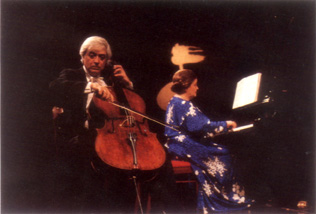
FITTING THE PUZZLE TOGETHER
As the reader may have noticed, I have avoided giving a detailed description of the Festival. It would have no place in a cultural magazine unless it discussed the cultural implications.
The need to implement a calendar of major events in Macau (with the correspondent social repercussions which would result from this enrichment) has been discussed but it is important to realize that the cultural effects are the most important because they are the most enduring. It is futile to repeat set phrases such as "'the preservation of the Portuguese approach to the world" which have been heard so frequently of late unless the means by which they can be achieved are to be officially recognized. Otherwise this is nothing but empty talk, forgetful of what is happening in Goa and, to some extent, all over the world. What has been built up over centuries could be lost over a few years by knocking down buildings, allowing the language to fall into disuse, replacing the customs or subverting values. To avoid this we must be realistic and establish genuine, concrete and deep-rooted structures in order to guarantee a continued Portuguese presence in Macau after the administration is handed over. This is why the existence of the Cultural institute is so important. It aims not only at preserving the existing cultures but also at encouraging interaction between them in order to ensure that the transition will not destroy their individual identities before it has enriched them.
Taking the words of the President of the Cultural Institute, after identifying "some key areas in cooperation and exchange between Macau and the Mainland... we are confronted with a set of preparatory tasks which must be begun now" (1).
The principal task is to select the target areas for this plan. This should be shared by all those who hold positions of responsibility in the Territory's administration. In other words not only the Government but also the private bodies should participate in meetings to discover our identity, where we stand, what are our alternatives, what path we should follow and which resouces are available to us (both human and material). If we really want to fit together all the pieces of the puzzle to produce an adequate picture, then twelve years is a short period of time. We will not discover new lands and people but we may discover that it is possible for this land and these people to launch upon a new style of cohabitation in the coming century.
Translated by José Vieira
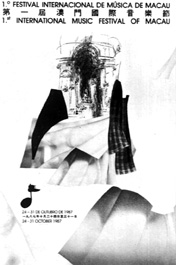
(1)Jorge Morbey: "'Culture in Macau: Future Perspectives", Review of Culture No 2
*Graduate in Political and Social Sciences of Lisbon's Technical University (ISCSP), he represented the Governor of Macau, in whose Department he is employed, as Coordinator of the Festival.
start p. 103
end p.